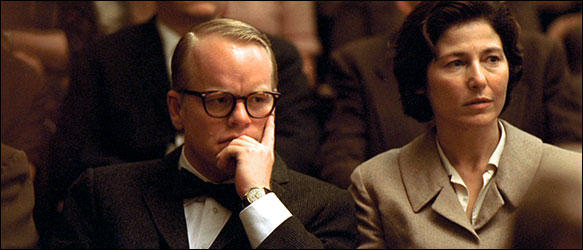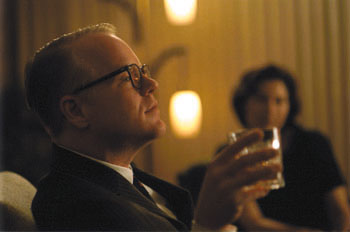
“Ever since I was a child, folks have thought they had me pegged, because of the way I am, the way I talk. And they’re always wrong.” Capote, starring Philip Seymour Hoffman, is a somber and compelling character study of the eponymous author, during the six years he spent in Kansas researching his renowned “non-fiction novel” of true crime, In Cold Blood. It’s a slow-moving film, but a memorable one. I don’t think I’d want to sit through it again anytime soon, but I do expect it’ll be on the short list for Best Actor nods come awards time.
To be honest, I have no memory or sense at all of Truman Capote, so I can only assume that Hoffman’s performance here, with his fey, lilting voice and precise, carefully-constructed mannerisms, is of a piece with the real author. Regardless, Hoffman’s Capote cuts a complex and striking figure that’s hard to take your eyes from — He’s at once vainglorious and needy, extroverted and remote, compassionate and manipulative, convivial and detestable. Intrigued by a newsclipping of four brutal 1959 murders, he and childhood friend Harper Lee (Catherine Keener) venture to the stark landscape of Holcolmb, Kansas, to investigate. Capote soon realizes that that story of the murders could make for a new kind of novel. But, as he comes to befriend the killers — most notably Perry Edward Smith (Clifton Collins, Jr.) — he also discovers that the problem with writing a non-fiction novel is that the characters have lives of their own, and events may not follow the path you necessarily intend.
This is Hoffman’s film through-and-through, and, like I said (sorry, David Strathairn), I expect that he’ll be a tough act to beat come awards season. Still, Capote is also anchored by a strong sense of place and by many fine supporting performances — most notably Collins and Keener — but also Chris Cooper, Bruce Greenwood, Bob Balaban, and The Wire‘s Amy Ryan. Strangely enough, Capote also bookends nicely with last week’s Jarhead, and crystallizes some of my problems with that film. While we were supposed to feel for Pvt. Swofford’s predicament that he’s gone to war and (sniff) can’t actually kill anybody, this film shows the devastating emotional consequences of a not-unrelated predicament — Capote can’t finish his work of genius until “the story ends,” so to speak. And, as Hoffman emphatically illustrates by the end of this powerful film, “More tears are shed over answered prayers than unanswered ones.”

